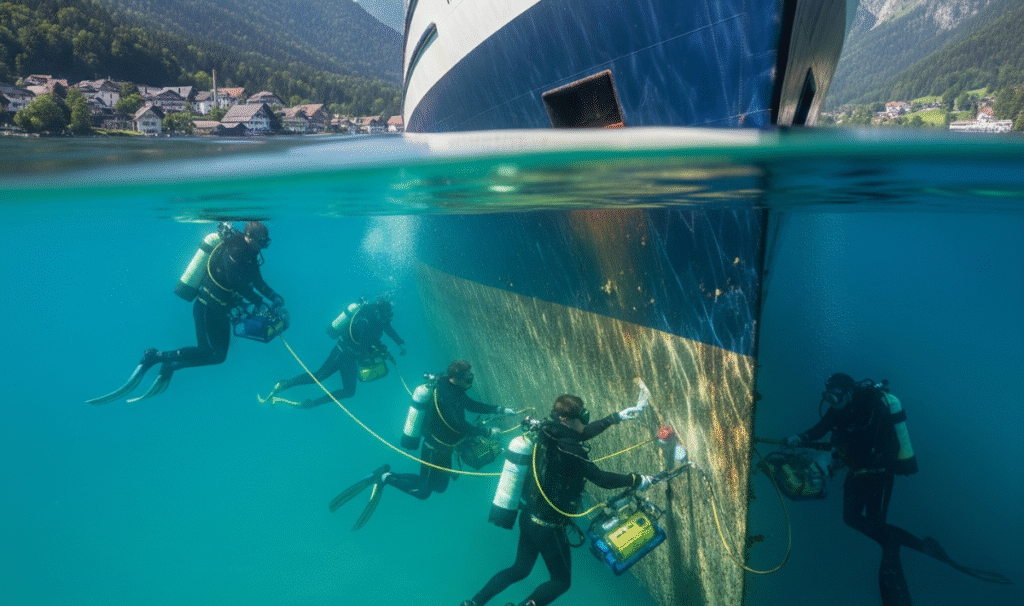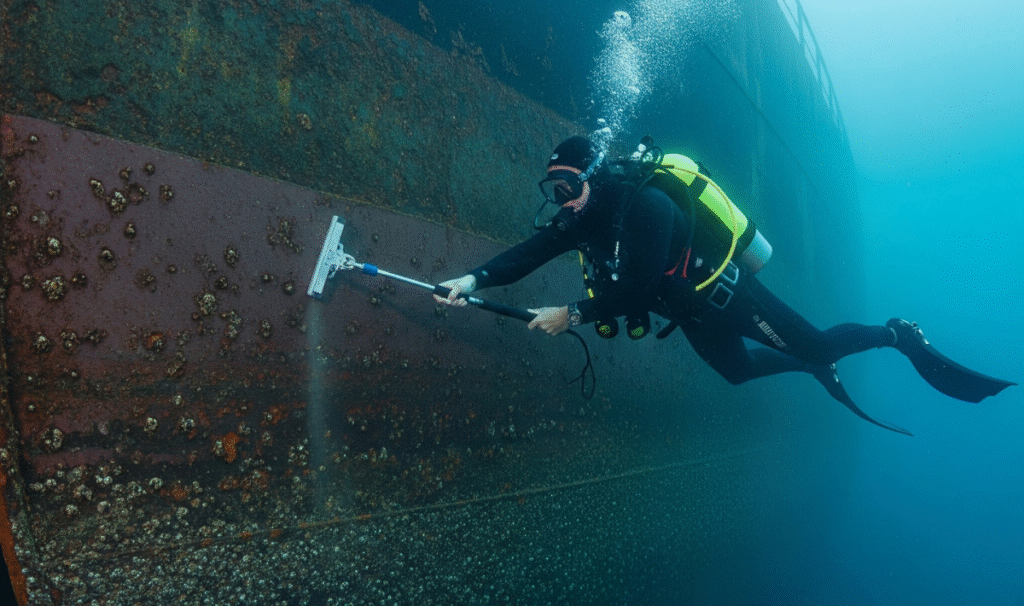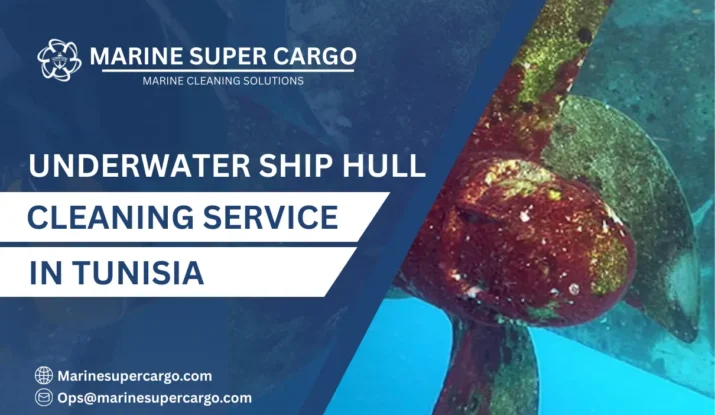Imagine a sprinter running in shoes weighed down by mud. Every stride feels heavier, slower, and more exhausting. That is precisely how a ship struggles when its hull is covered in barnacles, algae, and biofouling. What we don’t see beneath the waves makes a huge difference above them. In the Mediterranean waters, where trade converges and vessels move constantly, underwater ship hull cleaning in Tunisia has become vital for efficiency, sustainability, and cost savings.
The Concept of Hull Maintenance
The concept of hull maintenance revolves around keeping a ship’s submerged surfaces free from marine growth, sediment, and corrosion. Over time, algae, barnacles, and other organisms create drag that reduces efficiency and increases fuel costs. Traditionally, this meant hauling vessels into dry dock—an expensive and time-consuming task. Today, advanced methods using skilled divers and robotic cleaning systems allow hull cleaning to be carried out underwater, minimizing downtime while saving shipowners both money and valuable operational hours.
Why Tunisia’s Location Makes Hull Cleaning Strategic
Located on North Africa’s Mediterranean coast, Tunisia sits at a maritime crossroads. Ships bound between Europe, Africa, and the Middle East pass through its waters. With this constant flow of trade, underwater ship hull cleaning in Tunisia ensures vessels remain efficient and compliant as they transit crucial shipping lanes.

Understanding Biofouling and Drag
Marine growth increases resistance, forcing vessels to burn more fuel for the same distance—just as pushing a bicycle with a flat tire takes more effort. According to imo.org, fouled hulls can ramp up fuel consumption by 30–40%.
Fuel Savings and Faster Operations
By scheduling regular underwater ship hull cleaning in Tunisia, shipowners allow vessels to glide smoothly, cutting fuel demand and improving voyage times. The savings are not minor; they represent thousands of dollars per journey, keeping global trade cost-effective and sustainable.
Reducing the Transfer of Invasive Species
A ship’s journey may unwittingly transport microorganisms and invasive species across borders. When introduced into new ecosystems, these organisms can cause disruption. The International Association of Ports and Harbors identifies responsible hull cleaning as a major step in halting this spread.
Meeting IMO and MARPOL Compliance Standards
The MARPOL Convention and International Maritime Organization regulations call for proactive measures to cut emissions and protect biodiversity. Through underwater ship hull cleaning in Tunisia, shipowners align operations with both environmental obligations and global best practices.
Preventing Corrosion and Surface Damage
Marine buildup traps saltwater against the hull, which fosters corrosion and damages protective coatings. Over time, this weakens structural integrity. Regular underwater ship hull cleaning in Tunisia acts as preventative medicine, protecting the hull’s defenses.
Saving on Repairs and Dry Docking
Dry docking halts operations and drains finances. By choosing in-water cleaning, shipowners avoid emergency breakdowns, reduce docking frequency, and save significantly over time. Preventive underwater ship hull cleaning in Tunisia can mean millions saved in repairs and lost revenue.
Tools, Robotics, and Eco-Friendly Approaches
Divers use hydraulic brushes, magnetic robotic crawlers, and eco-friendly suction systems to safely remove biofouling. Some systems, as explained by cleanship.co, capture waste while cleaning to avoid contaminating the marine environment.
Safety Protocols and International Standards
Cleaning underwater requires strict adherence to safety protocols. Organizations like imca-int.com define global standards for divers and marine contractors. This ensures underwater ship hull cleaning in Tunisia remains efficient, safe, and environmentally sound.
Geographic Gateway Between Europe and Africa
Tunisia’s coastline lies at the heart of the Mediterranean, offering access to both European ports to the north and African and Middle Eastern trade to the south and east. For vessels navigating this central crossroads, Underwater Ship Hull Cleaning in Tunisia is strategically ideal.
Growing Shipping Activity and Skilled Workforce
The growth of Tunisian shipping infrastructure has brought skilled professionals into the maritime services sector. Divers trained in global standards are now a part of this growing hub, able to handle international shipping demands.
Clearing Misconceptions About Hull Cleaning
Myth: Cleaning Harms Hull Coatings
This myth suggests hull cleaning strips protective paints. But in truth, modern non-abrasive techniques protect anti-fouling coatings, extending their life.
Myth: In-Water Cleaning Damages the Marine Ecosystem
With regulated techniques, underwater ship hull cleaning in Tunisia protects ecosystems by limiting invasive species transfer and by applying waste collection methods—keeping local waters healthier, not worse.

Best Practices for Shipowners in Tunisia
Optimal Cleaning Frequency
In Tunisia’s warm coastal waters, biofouling accumulates quickly on ship hulls, especially during summer. To maintain efficiency and prevent costly drag, vessels operating in the region should schedule hull cleaning every 4–6 months. Regular in-water maintenance ensures smoother sailing, reduced fuel consumption, and protection of both the vessel’s structure and the surrounding marine environment.
Selecting Certified Hull Cleaning Providers
Shipowners should choose providers who follow IMO and IMCA guidelines while ensuring eco-responsibility. Certified, well-trained divers offer the safest and most reliable service for underwater ship hull cleaning in Tunisia.
Conclusion
Behind every successful voyage lies a clean, efficient hull. The three unparalleled benefits of underwater ship hull cleaning in Tunisia—fuel savings, environmental protection, and long-term cost reduction—make it indispensable for shipowners. In Tunisia’s strategic Mediterranean location, these practices don’t just protect ships; they safeguard global trade and marine ecosystems alike. Just like polishing a diamond reveals its brilliance, a clean hull ensures smooth, profitable, and responsible voyages.
FAQ:
Q1. How often should underwater ship hull cleaning in Tunisia be carried out?
Every 4–6 months, depending on water conditions and vessel traffic in the Mediterranean.
Q2. Does underwater ship hull cleaning in Tunisia save money long-term?
Yes. It reduces fuel costs, prevents corrosion, and minimizes expensive dry dock visits.
Q3. Is hull cleaning safe for the environment?
Absolutely. Modern practices involve eco-friendly techniques and debris collection that protect local marine life.
Q4. Why is Tunisia a significant location for hull cleaning?
Its central position on the Mediterranean makes it a prime stop for vessels transiting Europe, Africa, and the Middle East.
Q5. Can regular hull cleaning extend a ship’s lifespan?
Yes. By protecting coatings, preventing rust, and minimizing fouling, ships last longer and perform better.


